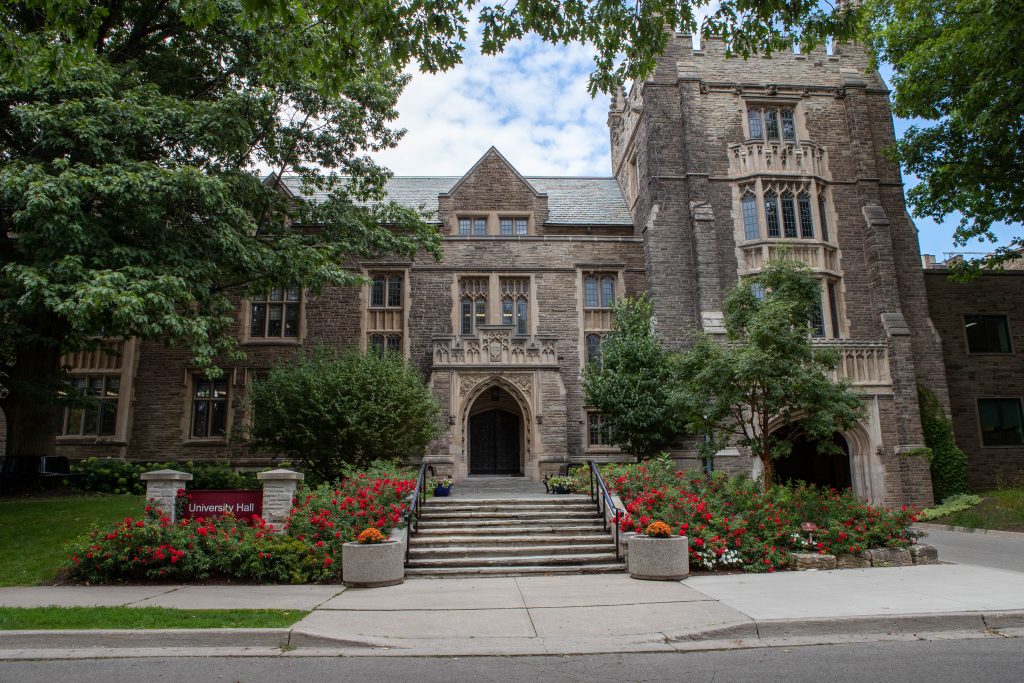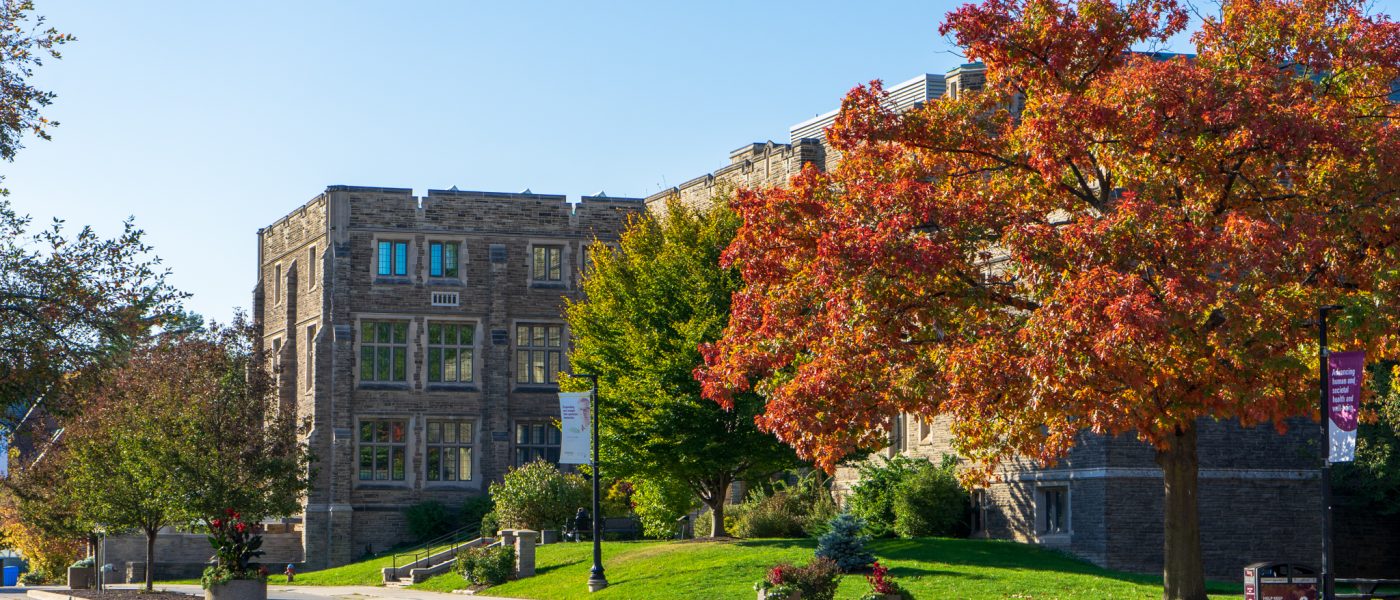MA Program Options

Exploring Your MA Options
As a candidate for the Master of Arts in Religious Studies, you will be required to spend at least one calendar year in full-time graduate study or the equivalent in part-time study. There are three options for achieving a Master of Arts: the thesis route (2-year program), the project route (2-year program), and the Major Research Paper route (1-year program). In consultation with your supervisor, you must choose from these options by January 30 of the year of initial registration as a graduate student.
Comparing MA Programs
1-Year MA (Major Research Paper)
Completion of five half-courses with at least a B- standing, and completion of RELIGST 701 Issues in the Study of Religions.
2-Year MA (Thesis or Project)
Completion of six half-courses, with at least B- standing, and completion of RELIGST 701 Issues in the Study of Religions.
- Three half courses in an area of concentration.
- Four of these half courses must be in Religious Studies; two half courses may be taken outside the department in a relevant area of study.
1-Year MA (MRP)
There are no language requirements other than English.
2-Year MA (Thesis or Project)
The candidate must demonstrate a reading knowledge of a language other than English which is most useful in the area in which the thesis or project is written. Responsibility for the choice of the language(s) to be examined lies with the advisory/supervisory committee which acts in accordance with individual area requirements, where such exist. In some cases, additional languages or more advanced levels of language competence may be required by the advisory/supervisory committee.
Language Requirements: Asian Religions
Buddhism and East Asian Religions:
For MA students whose theses involve thematic or comparative studies, two years’ study of Sanskrit or Japanese or Chinese is normally required.
Further language competence may be required by the supervisory committee where the thesis topic warrants it.
Language Requirements: Judaism and Christianity in Antiquity
Judaism in Antiquity
MA students must complete language requirements in Hebrew and a second language.
Christianity in Antiquity
MA students must complete language requirements in Greek and a second language.
All other areas
MA students must complete requirements in the language most likely to be of assistance in the student’s research.
The language requirement(s) should be met in one of the following ways:
- Where a student has already done course work in the relevant language at the university level, a grade of B- in a full year (six unit) second level university course (understood as equivalent to the relevant McMaster course) taken within the last five years is generally considered adequate for fulfilling the requirement in the language.
- Language exams in French and German are set by the department and normally graded by readers in the French and German departments. B- is the minimum passing grade. French and German exams are normally taken at three set times during the year (see Calendar of Dates).
- When the university offers facilities for examination (e.g., Latin, Spanish), the passing of the relevant examination will fulfill the requirement.
- Where languages are proposed for which no university offerings are available, the advisory/supervisory committee is responsible for arranging for the examination of the language.
- Where the language chosen is the student’s native language, and his or her knowledge of that language is of university level, the language requirement in that language may be understood as having been fulfilled.
- Final judgment on fulfillment of the minimum language requirements rests with the student’s advisory committee, whose decisions are subject to departmental approval.
- Summer language courses may be offered from year to year in French or German. These courses are designed for graduate students or students intending to enter graduate programs and are offered with special permission from the Department of Linguistics and Languages. Credit obtained in these courses may be accepted in fulfillment of the second language reading requirement.
1-Year MA (MRP)
Completion a Major Research Paper (MRP) between 7,500 and 10,000 words.
2-Year MA (Thesis)
In consultation with your supervisor, a thesis must be completed which is a significant and original scholarly contribution. A thesis should show an ability to deal with first-hand material in a limited problem in Religious Studies. The thesis must be defended in an oral examination and all MA degree candidates who have completed their oral defence must submit their revised thesis to both the Department and the School of Graduate Studies by the deadline dates specified for the second convocation following their defence. (Note: Text-critical studies or translation with commentary are acceptable, with the approval of the advisory/supervisory committee, as the functional equivalent of a thesis.)
2-Year MA (Project)
In consultation with your supervisor, a project must be complete. A “project” is defined by the faculty members of a departmental field. Normally a project will cover broad areas of learning. Projects will permit students to move into new areas, to read large and unfamiliar bodies of texts, and to deal comprehensively with large questions in central areas of concern.
What is the difference between a thesis and a project?
The basic difference between the two kinds of written documents is that a thesis attempts to arrive at some conclusion and to justify that conclusion with appropriate evidence. A project report, on the other hand, is not argumentative but informative. It recounts the research done by the student. Argument may fill the account, but it is argument merely reported on. Whereas a thesis argues for the certain or probable truth of a conclusion, a project report narrates what the anticipations of the inquiry were and whether they were realized or disappointed; what the strategy of the research was an what changes, if any, it underwent; finally, what the results were, positive and negative.
How do you choose a topic for a thesis or project?
- Areas in which a candidate may conduct thesis and project research are limited by available faculty and library resources.
- Candidates should not assume that they may write on any subject in the whole field of religious studies.
- Where the thesis or the project route is agreed upon, the advisory committee helps the student to settle on a topic.
- The student writes a formal proposal, one or two pages in length, with a brief bibliography.
- The proposal is submitted first to the student’s committee for the approval and signature of each member. The committee chair submits the proposal to the Graduate Affairs Committee for approval, together with a recommendation for the supervisory committee. The supervisory committee may or may not be the same as the advisory committee.
- The Graduate Affairs Chair will notify the student and the chair of the newly formed supervisory committee of the decision. The approval of the proposal and the composition of the supervisory committee will be reported for information at the next regular Department Meeting.
1-Year MA (MRP)
No oral defence of a Major Research Paper is required.
2-Year MA (Thesis)
A completed thesis must be examined by a committee of no fewer than three members (including the supervisor). When the supervisory committee consists of only two members, a third member is appointed by the department chair. The thesis is defended by the candidate in an oral examination before this committee. Both the written thesis and its oral defence must be deemed satisfactory. Copies of the thesis must be filed in the university and departmental libraries.
2-Year MA (Project)
A completed project must be examined by at least two faculty members appointed by the area. The examination is oral or written or both. On this examination, the student is expected to be able to give a clear account of the project research, and to present evidence of its scope and significance. Project reports are kept in the departmental library.

